
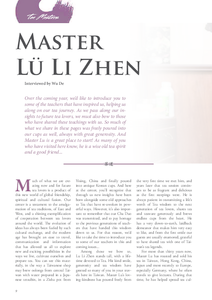 |
|
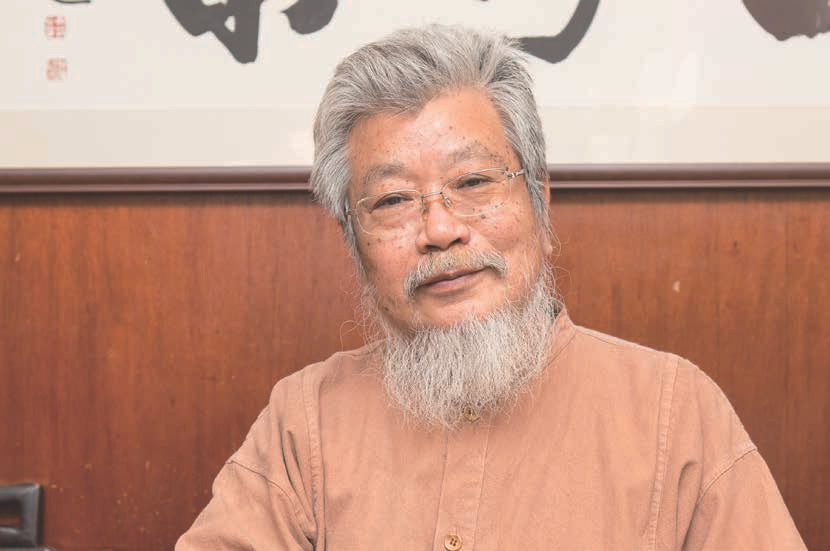
Much of what we are creating now and for future tea lovers is a product of this new world of global friendship, spiritual and cultural fusion. Our center is a testament to the amalgamation of tea traditions, of East and West, and a shining exemplification of cooperation between tea lovers around the world. The evolution of ideas has always been fueled by such cultural exchange, and the modern age has brought an ease to travel, communication and information that has allowed us all to explore new and exciting possibilities in the ways we live, cultivate ourselves and prepare tea. You can see this materially, in the way a Taiwanese shop may brew oolongs from central Taiwan with water prepared in a Japanese tetsubin, in a Zisha pot from Yixing, China and finally poured into antique Korean cups. And here at the center, you'll recognize that through us new insights have been born alongside some old approaches to Tea that have re-awoken in powerful ways. However, it's also important to remember that our Cha Dao was transmitted, and to pay homage to the previous generations of teachers that have handed this wisdom down to us. For that reason, we'd like to take the time to introduce you to some of our teachers in this and coming issues...
Among those we bow to, Lu Li Zhen stands tall, with a lifetime devoted to Tea. His kind smile, generosity and tea wisdom have greeted so many of you in your travels here in Taiwan. Master Lu's loving-kindness has poured freely from the very first time we met him, and years later that tea session continues to be as fragrant and delicious as the first steepings were. He is always patient in transmitting a life's worth of Tea wisdom to the next generation of tea lovers, shares tea and teaware generously and brews endless cups from the heart. He has a very down-to-earth, laidback demeanor that makes him very easy to like, and from the first smile our guests are usually enamored, grateful to have shared tea with one of Taiwan's tea legends.
For more than thirty years now, Master Lu has roasted and sold his tea in Taiwan, Hong Kong, China, Japan and more recently to Europe, especially Germany, where he often travels to give lectures. During that time, he has helped spread tea culture and awareness through many, many tea gatherings he participated in or hosted himself. We have attended and/or served at several of these gatherings over the years, and they are amongst the best we've seen. Sometimes such events can be overly commercial or repetitive in their themes. But Master Lu has always done a great job of roasting new and interesting flavors into the tea gatherings he hosts, like the time we shared four aged oolongs, including one that was one hundred years old, while floating down the same river tea was once transported down on a lovely yacht. We were entertained by musicians and occasional lectures on the history of oolong tea in Taiwan. In fact, we wrote about that gathering in an earlier edition of Global Tea Hut. And we've covered other gatherings as well, like the international chaxi he arranged in Taipei where we served tea alongside tea lovers from all over Asia while a dozen or so great musicians played in the courtyard next door.
Lu Li Zhen was born on June 6th, 1952 in Xin Bei, the very north of Taiwan. In those days, Taiwan was a simpler place without highways or skyscrapers. His father was a factory worker and his family lived simply. Tea is one of the seven "untaxable essentials" of Chinese life, so you'd be hard pressed to find a family whose daily life wasn't steeped in tea, especially in Taiwan. But in Master Lu's house, there was an even stronger connection: his father's younger brother owned a tea shop in Ban Chiao. Over cups of his favorite traditional-roast oolong, I've more than once heard Master Lu tell the story of how his uncle would take him to the tea farms in Dong Ding by motorcycle. His eyes gleam with a childish glee as he relates how it took seven or eight hours to get there from Taipei since there weren't any highways. What an adventure for a young boy! "It was great to get out of the city and into the mountains, and to ride on a motorcycle for so long. In those days, the adults would put us to work when they saw us, so getting the chance to go off on adventures with my uncle are some of the treasures of my childhood!"
The tea world was simpler then. There weren't as many teas and the shops were much more straightforward than today. We've heard from several of our teachers about the "good old days", when the price of teas genuinely reflected the quality. You could go into a shop and when a certain tea was labeled "special grade" it was certain to be a better tea.
Master Lu remembers sitting around with his relatives and his uncle's friends cupping tea that they were evaluating for sales. He said that each person would write down a price and they would end up with an average that way. He giggles, saying that he always marked the teas lower than the adults because he was the last to taste them and the tea had over-steeped and was bitter: "They'd all write eighty dollars and I would say sixty! And if they said sixty, I'd say forty!", he jokes. "Nowadays, people base the cost of tea on what they pay. That makes sense from a business perspective. You buy something and then mark it up and sell it at your cost plus profit. But if your product is overvalued to begin with, then you are selling it for a lot more than it's worth. Back then, tea shop owners knew tea very well. They knew how to taste it and appraise it. They based their prices on the quality of the tea, not weighed on business scales for profit margins. They worked with the farmers and determined prices based on a real scale that represented intrinsic value..."
Essentially, Master Lu is sharing an essential truth about the nature of buying tea in these times: most new shops don't have the same rapport with farmers or the skills and knowledge of tea as the previous generation. Back in the day, the shop owners and farmers worked together and priced the teas based on their qualities. That means that these days the more expensive teas are not necessarily better. If you go into a shop and one tea is 2,000 NTD per jin (600g) and another is 3,000, the cheaper one may be a finer tea. This is because the prices aren't based on the quality of the tea, but rather the price the shop owner paid for them. So, an American tea shop owner might travel to Taiwan and find a great tea for cheap and a mediocre tea that comes from a more expensive farm and he will sell them accordingly. This situation puts pressure on the consumer to know a lot more about tea. Master Lu gleams with pride when he emphatically states that all the teas in his shop are priced based on their quality, and many of the prices haven't changed in twenty years!
"Nowadays, people base the cost of tea on what they pay... Back then, tea shop owners knew tea very well. They knew how to taste it and appraise it. They based their prices on the quality of the tea, not weighed on business scales for profit margins."
From Master Lu's stories, you get the picture that his uncle genuinely loved tea. He sold Baozhong from Northern Taiwan, Oriental Beauty from Beipu, some Dong Ding oolongs, Tie Guan Yin from Muzha and a cheap oolong from Miaoli, where our center is. (Some of you may recall that we sent you an aged version of that from the 1970's many moons ago.) His uncle worked closely with the farmers themselves, which is a practice that Master Lu has continued to this day. Back then, all the tea was sold in paper wrappers, hand-packaged by shop owners like Master Lu's uncle.
When Master Lu was in his twenties, he started to develop a real love for Tea, especially the oolongs from Dong Ding. In those days, all the oolong produced in Taiwan was made in a traditional way, with heavier oxidation and a deeper charcoal roast. And tea farms were small. Everything was produced by hand. Some of the teas from that time have survived, and they have an amazing charm born not just out of age, but rather the simplicity and natural grace of the times. "Most everyone in the tea industry at that time loved tea," Master Lu says with a smile. And that seemed like the opportune time to turn the conversation to the changes in the industry over time, asking about the movement towards lighter, greener oolongs. We say that it must have taken some time to get used to such teas and Master Lu puts his cup down, grinning ear to ear, "We still haven't gotten used to such teas!"
When I was a kid, everything in America was made in Taiwan. It's interesting that I ended up living here, for all the times I looked down at Star Wars figures that had "Made in Taiwan" labels and wondered about the mystical island on the other side of the world where all the toys come from... Anyway, the huge economic boom in the seventies brought a lot of changes to Taiwan: wealth, infrastructure and a boom in the luxury and cultural markets, including tea and teaware. Tea farms started to get bigger and a trend of moving up the mountain began. The higher-altitude tea farms in central Taiwan don't get as much sunlight, and therefore produce a lighter tea. Master Lu jokes that when the oolong tastes just like green tea, it's not oolong - it's green tea! Traditional oolong was oxidized to around forty percent and then roasted. Nowadays, teas tend to be oxidized much lower and roasted without much skill. While Master Lu does offer a variety of oolongs of different oxidation and roast, he still likes to drink the traditional teas most.
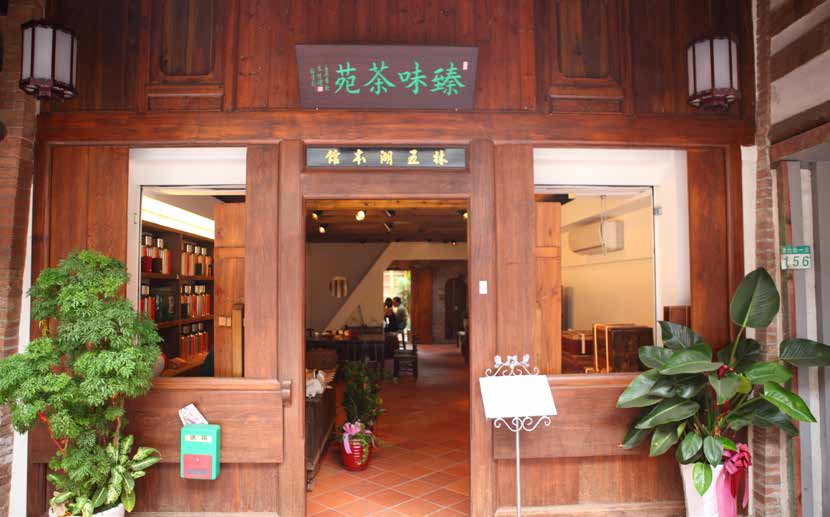
In the late seventies, Master Lu owned a restaurant that wasn't doing well. His uncle invited him to come work with him, wholesaling tea. His uncle's children, Master Lu's cousins, had other careers and the two of them seemed to share a similar destiny and connection. Over time, Master Lu's uncle would pass on the relationships he had cultivated with farmers over decades to his nephew, some of which continue today - even unto the next generations of farmers as well. As a result of the economic changes in Taiwan, tea shops were beginning to open all around. The domestic wholesale tea business wasn't as lucrative as working with retail and wholesale both, so in 1980 Master Lu opened his first tea shop in Yong He, Taipei, selling many of the same teas his uncle had...
As Master Lu learned more about tea, his understanding of Yixing teapots and other kinds of tea also developed. In the 1980's there were a lot of Japanese and Hong Kong tourists in Taiwan, and many became his clients. He sold a lot of tea wholesale to Hong Kong and started making trips there to do business and meet with tea friends. At first, he didn't think much of the puerh tea there. "I had really only tried shou tea. I didn't really like it." On one such trip, his friend convinced him to try some aged puerh and the first cup blew him away. "My friend said it was Song Ping Hao. But at the time, that didn't mean anything to me." Master Lu imported some aged puerhs, but was unable to sell them in Taiwan. As we talk on about his life, he has an amazing ability to sweep you up in his nostalgia. Maybe it's the wonderful teas he's brewing, his genuine smile or perhaps our mutual love for the Leaf... "It's amazing. I can hardly believe it! Some of the aged teas I sold to a client and friend for two hundred thousand... Well, those same teas I bought back twenty years later for thirty million! Unbelievable!"
It wasn't really until Deng Shi Hai's seminal book on puerh tea that people in Taiwan started to develop a real interest in puerh tea. It was around that same time that Master Lu made puerh history. He and his friends were curious why Yiwu wasn't producing tea like back in the Antique Era (pre-1949). They were drinking all these amazing aged puerhs from those times and so, of course, wanted to go and see the place where they had come 12 Tea Masters from. When they got to Yiwu, they were shocked to find that tea production had all but ended. "People there didn't know anything about the industry that had once thrived there." Moved by the spirit of Tea, to share and inspire other tea lovers, Master Lu wondered what future tea lovers would drink, not having great aged vintages of Yiwu tea themselves...
Looking around, he found some old timers that still knew how to process tea and began producing some old-growth, forest tea from Yiwu like back in the day. In 1994, Master Lu was the first person to go to Yunnan and produce single-region puerh tea, at least for an age. In the Masterpiece (1949-1972) and Chi Tze (1972-1998) eras of puerh, all the tea was blended from different farms and regions - often combinations of some forest tea and some plantation tea. The maocha was all brought to Menghai, and from there processed into cakes for distribution to Hong Kong, Malaysia and other regions. But in the earlier Antique Era, puerh was more local and made from old-growth forest tea exclusively. Master Lu's early cakes were a throwback to that time, and one that revitalized the tea industry in the region.
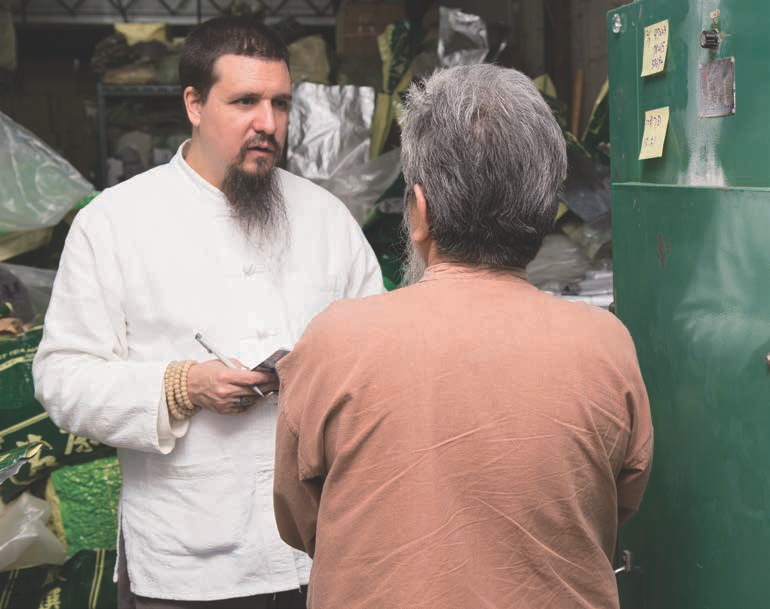
In that way, Master Lu has been a trail-blazer for the modern era of puerh tea: one in which forest tea is once again celebrated and valued by tea lovers around the world, and in which small boutique owners from around the world travel to Yunnan themselves to produce single-region teas. As we spoke about in our September issue, this isn't to say that all blended tea is inferior. They both have their merits - their good and bad cakes. Over the course of his first three or four years of traveling to Yunnan, Master Lu produced around three tons of tea. In his happy way, he tells us that "in those days" the tea was 7 RMB per kg. "I would pay them fifteen all at once, if they promised to sell me three years of tea... The real expense was in the importation. We couldn't do it by ourselves, and import fees were high. We had to pay around 300 NTD per kg to import the tea." None of that early tea had a wrapper even. Master Lu says that he hardly sold any of it at the time, since he mainly bought it to store for future tea lovers. When we ask if he has any left he giggles with the joy of a boy and brews us some amazing mid-nineties tea, saying that he has since sold all the tea he produced in the nineties to friends and tea lovers, though slowly over the years...
If you go to Yiwu's old street, there isn't a farmer that doesn't know Master Lu, and with a great respect for what he has done for the industry. To this day, he continues to produce Yiwu tea every year. His cakes are always of excellent quality, being made of old-growth, forest tea. He has every cake wrapped with a unique, hand-painted wrapper made by artist friends, lending them each a life and vibrancy. It's difficult to appreciate puerh tea in this modern era without offering a bow to Master Lu, for changing the way puerh was made and appreciated in modern times and starting many of the positive trends that continue today. Before Master Lu and other Taiwanese started traveling to Yunnan to write books about puerh, tracing its history and producing cakes in traditional ways, the industry was a shriveled remnant of its former glory. But now, trade is booming. And puerh tea has gone worldwide. Of course, many people have played major roles in restoring puerh to front stage and in revitalizing traditional, single-region cakes from old-growth trees. Master Lu himself wouldn't want any credit, preferring to be humble and just drink some tea, but we can't help but raise a cup of Yiwu tea in his name...
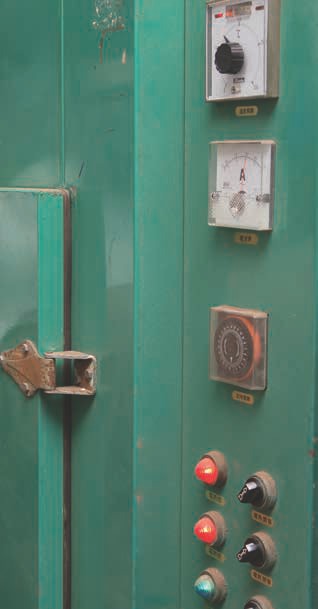
With the confusion in the modern tea world, and so much misinformation, we thought it would be great to ask Master Lu what his advice would be to the beginner looking to find fine tea and learn more. He brought up the age-old proverb of tea made by businessmen "tasting like coin", suggesting that the feeling that surrounds a transaction is as important as the product itself. He said that the most important thing is that the shop owner really has Tea Spirit and loves Tea. If you also love Tea, that won't be hard to feel out when you enter a shop. "When someone loves Tea, they may not do so much business, but they will probably have better quality teas and a richer body of tea wisdom." The vendors with the flashiest marketing and lots of fancy packaging are almost always more interested in what Tea can do for them than in Tea itself. It is a business avenue for them, as opposed to a way of life.
Like most of the tea masters of his generation, Master Lu often repeats that when buying Tea, stories don't matter. Flowery descriptions or stories won't improve the quality of a tea. The proof is in the cup. However, when sharing tea with guests or friends, a story about a tea can enhance the experience, especially if you found the tea in an interesting way. But when buying tea, it is better to rely on your own experience and keep things simple. "Those who know don't speak, and those who speak don't know", says the oldest of sages
Master Lu reminded us that in a capitalist market, the consumers have all the power. All the changes we'd like to see in the sustainability and environmental safety surrounding tea production are in our hands. When we promote these qualities, only buying healthy, chemical-free teas, we help create the world we want to see.
Master Lu roasts all the oolongs he sells in his shop, following a tradition where the farmers in Taiwan produced maocha that the tea shops then roasted to their and their clients' tastes. Nowadays, most farmers roast their own teas and often without as much care or concern as the old master roasters have done. "Evaluating maocha is a very different process than tasting finished tea," he says, taking out four tasting bowls and filling them with a Baozhong and three Li Shan teas he is going to roast for an upcoming competition. We taste the teas and he asks us to smell the leaves deeply. He's proud when we choose the third tea as our favorite, saying that he agrees. "You can taste the weather and any processing issues in the maocha very clearly!" He then goes on to point out that while the third tea is the best maocha, the fourth will be the highest quality finished tea. "As the third tea steeps longer - try it again now," he says pointing. "It has a lingering astringency. When roasting tea, the bitterness and astringency are very important. Because of that, I will just roast the third tea until its fragrance comes out. But the fourth tea is now bitter. Bitterness is good. It means I can roast this fourth tea longer and deeper, coaxing more out of it. In the end, it will be a deeper and more long-lasting tea, with a more satisfying tea liquor..." He giggles and joyfully invites us to come back next week to try the finished teas again.
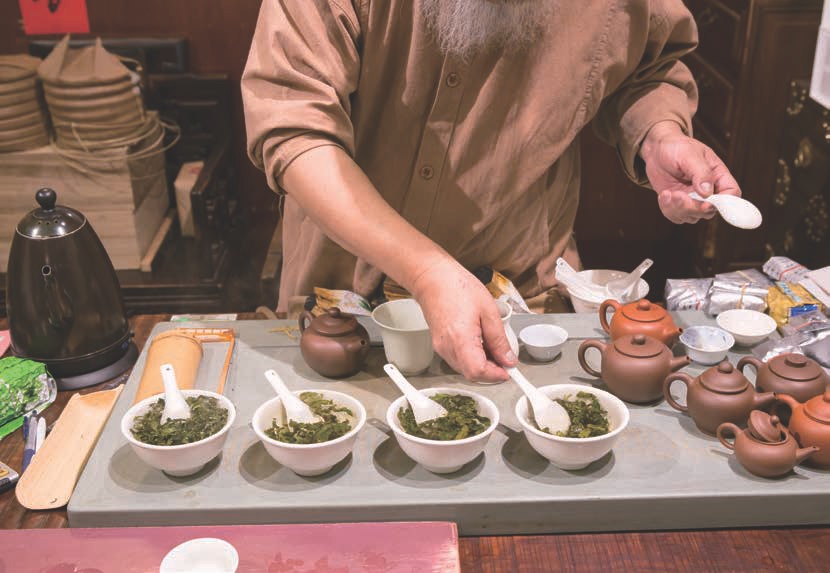
Our discussion of bitterness brings up one of our favorite teachings that we've received from Master Lu - one you'll hear a lot about when you come to our center: The nature of Tea is bitter. Tea is a bitter plant. Master Lu always says this, reminding us that before it was called "cha (茶)" in Chinese it was called "tu (荼)" which means "bitter herb." He always reminds us that as you drink more tea, you begin to enjoy the bitterness and its transformation more. He then always relates this to life, suggesting that people always want to process the bitterness out of life - enjoying the pleasure and hiding from the pain. But the suffering is the medicine. The bitterness is the medicinal part of the herb; the part that heals us. We need the bitterness along with everything else. If we don't embrace the hard times, the good ones are also meaningless. Then the lows are times to pass over quickly in order to get to the highs. But they are also a part of our experience as humans - our growth and change. And they are to be celebrated, as well. Every time Master Lu discusses his ideas about bitterness, its relationship to tea appreciation and life, we always learn something new and refine our appreciation for the Leaf and Cha Dao.
"And that hospitality and loving-kindness is the true spirit of Tea. You can see it in all the masters' eyes - inviting you with a warmth that fulfills as much as their teas do."
And speaking of highs in life, in 2011, Master Lu won first prize in the Li Shan Tea Competition for his roasted teas. He has won many awards in his long career, but this is the one he is most proud of, displaying it on the wall of his shop. We remember when he won, as he asked us to accompany him to the awards in Tai Chung and serve tea at the festival that proceeded the judges' decision. He was glowing then. And rightly so! There were thousands of teas in that competition, and winning first prize is no small feat! Such mastery (gongfu) of roasting oolong teas is a waning art, with fewer and fewer shops roasting their own teas. More tea is roasted large scale at the farms, and rarely with such expertise and love.
A love of Tea is something that comes up a lot when we reminisce with the tea generation above us. All these masters, and Master Lu is no exception, shine with the kind of Tea Spirit that attracted most of us to tea in the first place. He jokes that all the money he earns these days is mostly for his son and grandchildren, so "why not just share tea out of a love of doing so". Though this seems to imply that this is the wisdom of age, we doubt that there was ever a time that Master Lu wasn't kind and generous to anyone who wanted to share some tea, learn about tea or tea culture (or just have a chat). And that hospitality and loving-kindness is the true spirit of Tea. You can see it in all the masters' eyes - inviting you with a warmth that fulfills as much as their teas do. These days, there are way too many people invested in tea as a business, resulting in over-production that strains and damages natural environments, not to mention crowded and convoluted tea markets that are confusing to the consumer. Such production methods and business tactics aren't based on quality, and they aren't service-oriented either. Master Lu carries another, more traditional energy from a time when things were simpler and you could trust that the merchants bought what they would drink themselves, and based on generations of expertise, would sell you teas that made you feel good - healing teas. Like most masters of his time, he often repeats that the "proof is in the cup... Tea tells the story. There are no words needed."
These days, Master Lu and his family run two shops and a tea house in San Tze. His nephews and brother all work with him, assuring that a lot of his connections, wisdom and understanding will survive into the next generation. We find his nephews kind and hospitable when Master Lu is off in Yunnan or Yixing. He is selfless with his time, teaching us about how to taste tea and about the changes he's seen in his life and what he's learned from them. Like I am sure all of you do, we look forward to sharing more tea with him, hearing his stories and learning about the ways he evaluates, roasts and creates fine teas.
At the end of several pots of tea, we ask Master Lu if he has any goals for the future. He smiles, "Of course! I have three main goals!" he says emphatically, and then goes on to point by point reaffirm our own goals in his own words, inspiring us to feel like we are on the right path. First and foremost, Master Lu hopes to promote healthier and safer tea production. He talked to us at length about how the trees in the forests of Yunnan can survive centuries or even millennia because of the natural ecologies. "The trees are never destroyed completely by pests, because if the pest population rises high in a natural ecology, then that attracts birds, monkeys and other species that come and eat them up, restoring balance." The modern trend towards quantity rather than quality upsets him. It's a message you'll hear echoed lots around here: that we are the care-takers of the land and if we don't steward it well, the future tea lovers won't have any tea.
Master Lu's second goal is to promote health, peace and ease in those who drink tea, helping them to live happier and calmer lives. This, too, is something the Earth needs desperately.
His final goal is to shift the perspective of tea lovers, especially more seasoned ones, to stop thinking of tea as something snobby. Real tea is a natural product, changing from region to region and season to season. He hopes that people will celebrate these differences more fully, reducing production and returning it to the hands of artisanal tea makers. "The tea world needs standards, of course, but it's easy to make them too abstract and discount the natural changes and qualities of a particular terroir. Tea should be produced with the intention of making the best quality possible!"
Like his character, Master Lu's tea is unadorned. He isn't showing off. There's no pretension in his shop. It's the ordinary kind, but it shines with a hospitality rarely found in the tea world these days. It's the kind of place you can come to every day and drink some tea without having to buy something - the kind of place where you're greeted by name and with an honest and open heart that is genuinely pleased to have you there. And that is the spirit of Tea, the "Master" that is the honorary title before his name...
